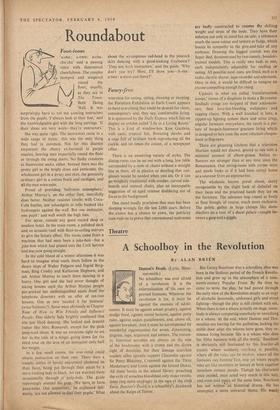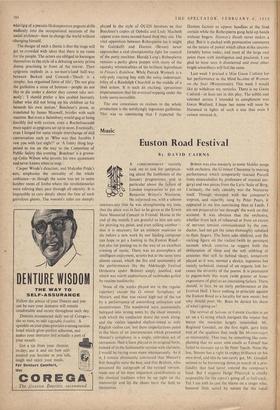Theatre
A Schoolboy in the Revolution
BRIEN By ALAN No schoolboy was ever afraid of a revolution. It is the externalisation Of ' his own re- pressed fantasies. Whatever the revolution is for, it must be
• against the enemies of adole- scence. It must be against sexual prudery, against stodgy food, against moral lectures, against petty rules, against unjust punishments, and, above all, against boredom. And it must be accompanied by wonderful opportunities for arson, dynamiting, disguise, rape, argument and torture. The roman-. tic historical novelists are always on the side of the headmaster with a crown and the divine right Of dominies, but their teenage anarchist readers often secretly support Chauvelin against Sir Percy Blakeney, Crdmwell against the Three Musketeers) and Lenin against the Grand Dukes. All those books in the school library preaching the evils of senseless bloodshed only make revolu- tions ring more excitingly in,the ears of the sixth form. Danton's tecith is a Schooll;hy's daydream about the Reign of Terror. But Georg Buechner was a schoolboy who was born in the Stalinist period of the French Revolu- tion and grew up in the atmosphere of a nine- teenth-century Popular Front. By the time he came to write the play, he had passed through the early view of the Revolution simply as an orgy of alcoholic lemonade, undressed girls and street fighting—though the play is still clotted with sex. When there is not a whore actually on stage, some- body is always comparing somebodyor something to a whore. At the end, when Denton and Des- moulins are leaving for the guillotine, locking the stable door after the whores have gone, they re- nounce living because 'life is a where who does her filthy business with, all the world.' Buechner is obviously still fascinated by ,this free-for-all society where suddenly 'anything is possible, where all the rules can he broken, where all the fantasies can become-fact. and Yet where people who act like 'monsters or heroes or both together somehow remain people. Though his characters once existed, once acted very much in this way, and even said Illy of the same lines, Buechner has not written an historical drama. He has attempted a more universal theme. His wordy Whirligig of a pseudo-Shakespearean pageant drills endlessly into the occupational neurosis of the social architect—how to change the world without -changing himSelf.
The danger of such a theme is that the stage will get so crowded with ideas that there is no room for the people. The actors are obliged to harangue themselves in the style of a debating society prima donna practising in front of the mirror. Their epigrams explode in a no-man's-land half-way between Beckett and Coward—'Death is a simpler, less organised form of life'; `Do not give the guillotine a sense of humour—people do not like to die under a doctor they cannot take seri- ously'; 'I should prefer a less exalted heavenly father who did not bring up his children so far beneath his own station.' Buechner's prose, as translated by James Maxwell, bristles with such maxims. But even a Saintsbury would gag at being forcibly fed with caviar; even a Rochefoucauld must squint at epigrams set up in neon. Eventually, even I longed for some simple interchange of dull conversation such as 'Who was that Jacobin I saw you with last night?' or 'A funny thing hap- pened to me on the way to the Committee of Public Safety this evening.' Buechner is a grown- up Cohn Wilson who invents his own quotations and never knows when to stop.
Casper Wrede's direction, and Malcolm Pride's sets, emphasise the unreality of the whole ambiance—as though the scene was set in some lumber room of limbo where the revolutionaries were reliving their past through all eternity. It is impossible to care deeply about the fate of such garrulous ghosts. The women's roles are damply played in the style of OUDS heroines so that Buechner's copies of Ophelia and Lady Macbeth appear even more second-hand than they are. The vital opposition between Robespierre (as it might be Gaitskell) and Danton (Bevan) never approaches a real championship fight for control d the party machine. Harold Lang's Robespierre remains a perky glove puppet with many of the squeaky whimsicalities of his brilliant leprechaun in Pinion's Rainbow. While Patrick Wymark is a roly-poly roaring boy with the noisy indestructi- bility of a Randolph Churchill in the middle of a libel action. It is such an exciting'. uproarious impersonation that his eventual topping under the knife seems incredible.
The one concession to realism in the whole production is the terrifyingly ingenious guillotine. This was so convincing that I expected the Danton faction to appear headless at the final curtain while the Robespierre gang held up hands without fingers. Danton's Death never makes a play. But-it is packed with provocative comments on the nature of power which often strike. uncom- fortably home today, and most of the large cast point them with intelligence and precision. I am glad to have seen it disinterred and most other bright schoolboys will feel the same.
Last week I praised a Miss Gwen Catford for her perforMance as the blind hcioine of Woman on the Stair (Westminster). This week I would like to withdraw my remarks. There is no Gwen Catford—at least not in this play. The subtle 'and talented actress I intended to compliment was Gwen Watford. I. hope. her name will soon be blazoned- in lights of such a size that even I cannot misread it.







































 Previous page
Previous page